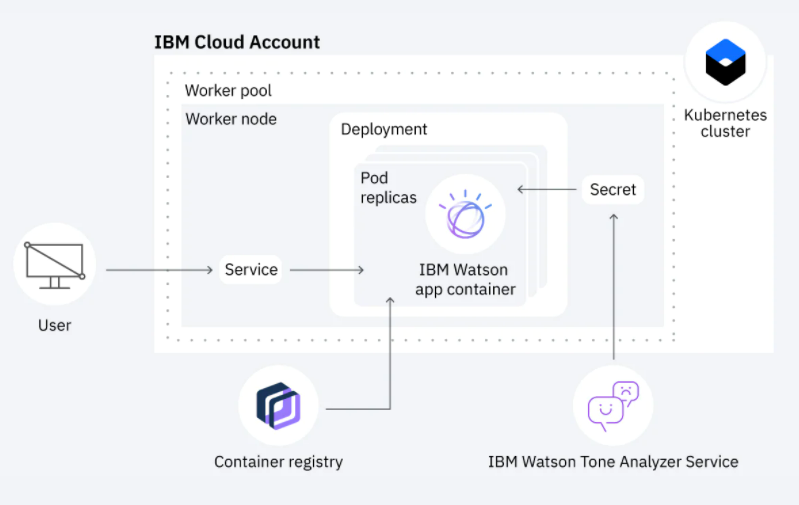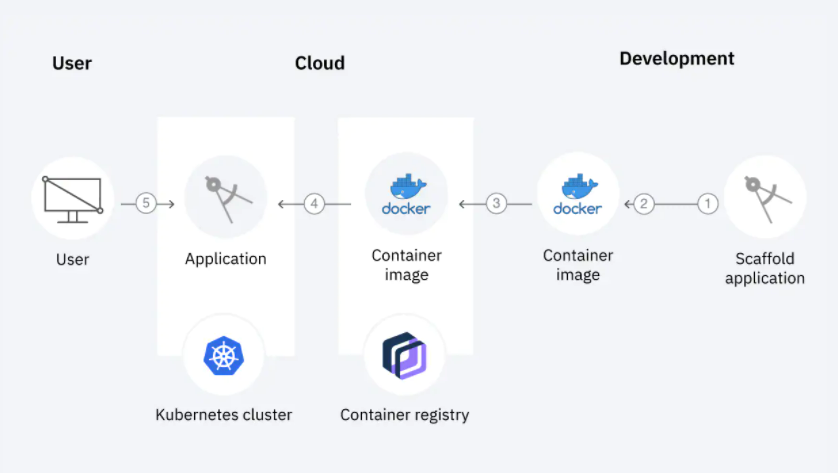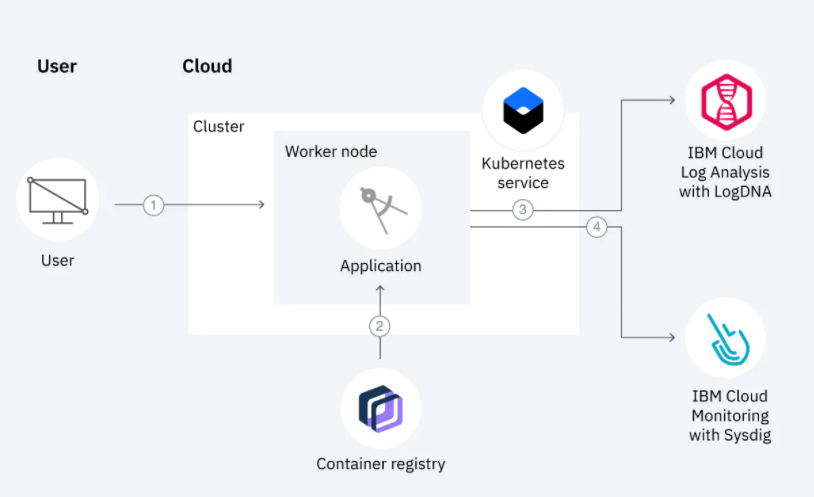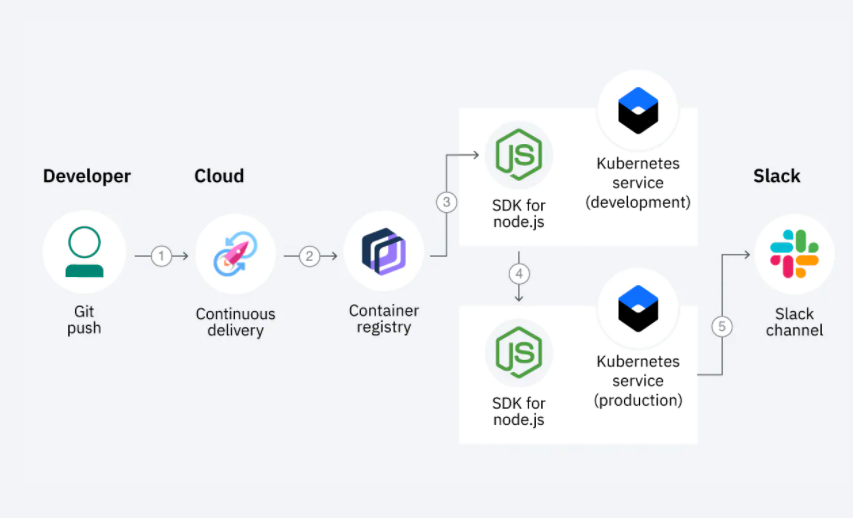IBM Sterling Containerization
Deploy secure, highly available clusters in a native Kubernetes experience
Deploy secure, highly available clusters in a native Kubernetes experience
At a high level, it’s easy to see why Kubernetes is popular: it’s a flexible and scalable, open source tool orchestrator that streamlines the task of managing containers.
Experience a certified, managed Kubernetes solution, built for creating a cluster of compute hosts to deploy and manage containerized apps on IBM Cloud®. IBM manages the master, freeing you from having to administer the host OS, container runtime and Kubernetes version-update process.

See how a fictional public relations firm uses Kubernetes capabilities to deploy a containerized app on IBM Cloud. With IBM Watson® Tone Analyzer Service, the firm gets feedback on its press releases.
Learn how to scaffold a web app, run it locally in a container, then deploy it to an IBM Cloud Kubernetes cluster. Also learn how to bind a custom domain, monitor the health of the environment and scale.


Learn how to create a cluster and configure the log analysis and monitoring services. Then, deploy an app to the cluster, view and analyze logs with Kibana and view health and metrics with Grafana.
Learn how to set up a CI/CD pipeline for containerized apps running in Kubernetes. This use case covers the setup of source control, build, test and deploy and integrating security scanners, analytics and more.

Use tools and APIs you know for a consistent experience, even working across cloud infrastructures.
Guard your cluster infrastructure, isolate compute resources and ensure compliance in deployments.
Integrate cognitive solutions with a variety of IBM Watson® APIs to extend the power of your apps.
Automatically deploy containers on compute hosts based on available resources across the cluster.
Configure a custom Kubernetes cluster that autoscales and recovers containers per defined policies.
Use the built-in logging and metrics service to monitor the performance of clusters and containers.
Learn about the advantages of containers vs virtual machines, and discover compelling reasons for adoption containers, including portability, resource efficiency, and speed.
Containers can run anywhere
Containers do not require a separate operating system
Run multiple containers on the same server
Containers are a lightweight package that everything needed to run
Containers make it easy to horizontally scale distributed applications.
Deploy Web Applications on Kubernetes at High-Speed With IBM Cloud Container Services.
Get answers to the most commonly asked questions about IBM Cloud Kubernetes Service.
IBM Cloud® Kubernetes Service provides a fully managed container service for Docker (OCI) containers, so clients can deploy containerized apps onto a pool of compute hosts and subsequently manage those containers. Containers are automatically scheduled and placed onto available compute hosts based on your requirements and availability in the cluster.
Every cluster is provisioned with a Kubernetes master IBM operates and manages, and worker nodes deployed into the client-owned infrastructure. Your worker nodes are single-tenant and dedicated to you, the client. Manage your worker nodes by using IBM-provided tools for operating system patch deployment, container runtime updates and new Kubernetes versions.
With IBM Cloud Kubernetes Service, you can deploy Docker containers into pods that run on your worker nodes. The worker nodes come with a set of add-on pods to help you manage your containers. Install more add-ons through Helm, a Kubernetes package manager. These add-ons can extend your apps with dashboards, logging, IBM Cloud and IBM Watson® services and more.
In the IBM Cloud Kubernetes Service, you can enable horizontal pod autoscaling to automatically increase or decrease your app pods in response to your workload needs.
You want control and access to compute infrastructure running containerized workloads to ensure your app has the resources it needs. You also want a stable environment for your apps and lower maintenance costs. IBM Cloud Kubernetes Service manages the master, freeing you from having to manage the host OS, container runtime and Kubernetes version-update process.
You can provision block storage for your cluster and use the storage by your application as a persistent data store. IBM Cloud Kubernetes Service provides predefined Kubernetes storage classes you can use to choose the block storage capacity and performance characteristics that meet your application requirements.
The IBM Cloud Kubernetes Service fully integrates with the IBM Cloud platform’s IP addressing, network routing, ACL, load balancing and firewall capabilities. When you deploy standard clusters, you can specify the virtual network for your worker nodes that provide network segmentation and isolation. Every cluster is set up with predefined network policies.
Every cluster is set up as a single-tenant cluster dedicated to you only. To secure the communication between the Kubernetes API server and your worker nodes, the IBM Cloud Kubernetes Service uses an OpenVPN tunnel and TLS certificates, and monitors the master network to detect and remediate malicious attacks. You control user access to cluster resources.
Obtain a private Docker image registry as a service in the platform. Each tenant in the IBM Cloud Container Registry has a private hosted registry, built using Docker v2 registry to secure storage of Docker images in the cloud. Integrated Vulnerability Advisor scans images with IBM® X-Force® Exchange and its ISO27k policy scans live containers and packages.
With IBM Cloud Kubernetes Service, you are in control of your cluster and can implement your own custom Kubernetes scheduling and affinity logic for your Kubernetes deployments.
| Cookie | Duration | Description |
|---|---|---|
| cookielawinfo-checkbox-analytics | 11 months | This cookie is set by GDPR Cookie Consent plugin. The cookie is used to store the user consent for the cookies in the category "Analytics". |
| cookielawinfo-checkbox-functional | 11 months | The cookie is set by GDPR cookie consent to record the user consent for the cookies in the category "Functional". |
| cookielawinfo-checkbox-necessary | 11 months | This cookie is set by GDPR Cookie Consent plugin. The cookies is used to store the user consent for the cookies in the category "Necessary". |
| cookielawinfo-checkbox-others | 11 months | This cookie is set by GDPR Cookie Consent plugin. The cookie is used to store the user consent for the cookies in the category "Other. |
| cookielawinfo-checkbox-performance | 11 months | This cookie is set by GDPR Cookie Consent plugin. The cookie is used to store the user consent for the cookies in the category "Performance". |
| viewed_cookie_policy | 11 months | The cookie is set by the GDPR Cookie Consent plugin and is used to store whether or not user has consented to the use of cookies. It does not store any personal data. |
Thank you for submitting your details.
For more information, Download the PDF.
Thank you for registering for the conference ! Our team will confirm your registration shortly.
Invite and share the event with your colleagues
IBM Partner Engagement Manager Standard is the right solution
addressing the following business challenges
IBM Partner Engagement Manager Standard is the right solution
addressing the following business challenges
IBM Partner Engagement Manager Standard is the right solution
addressing the following business challenges